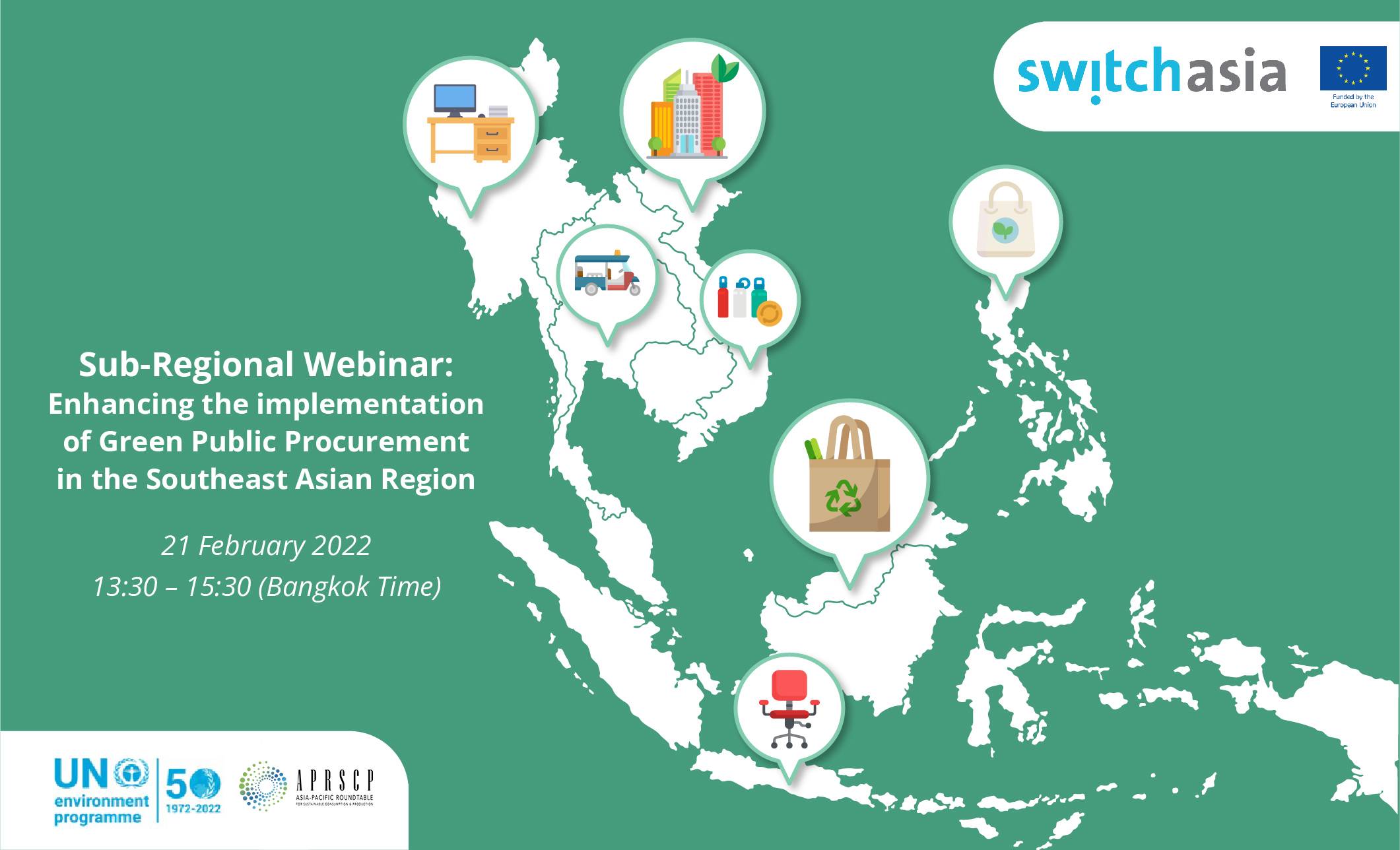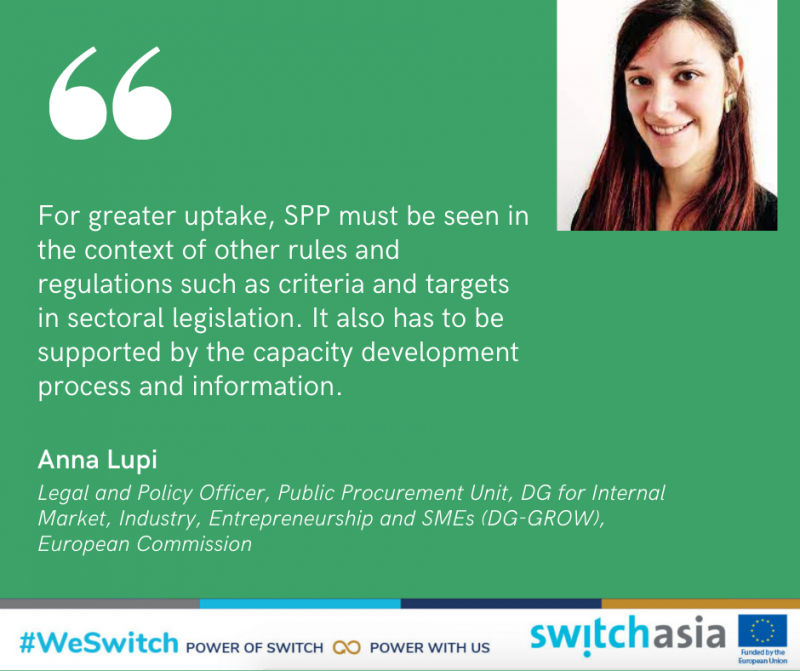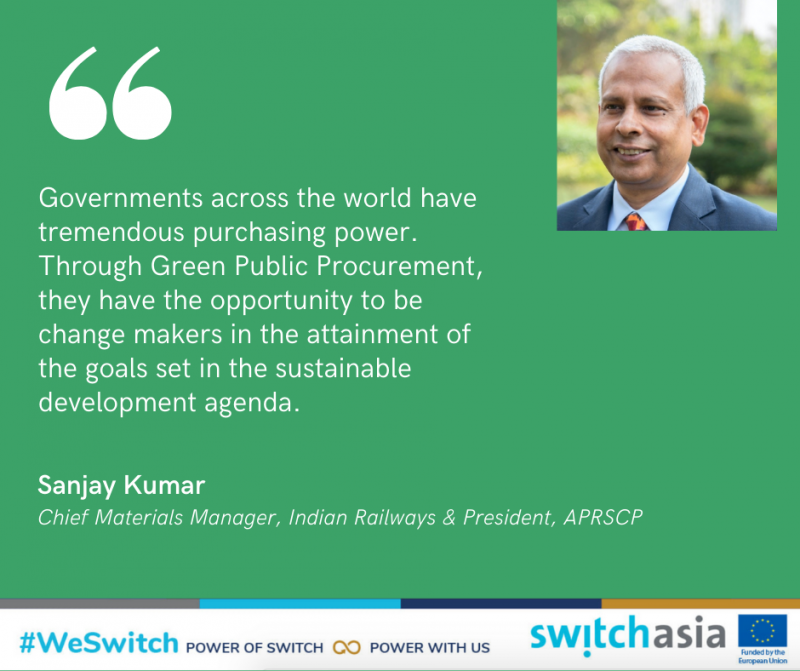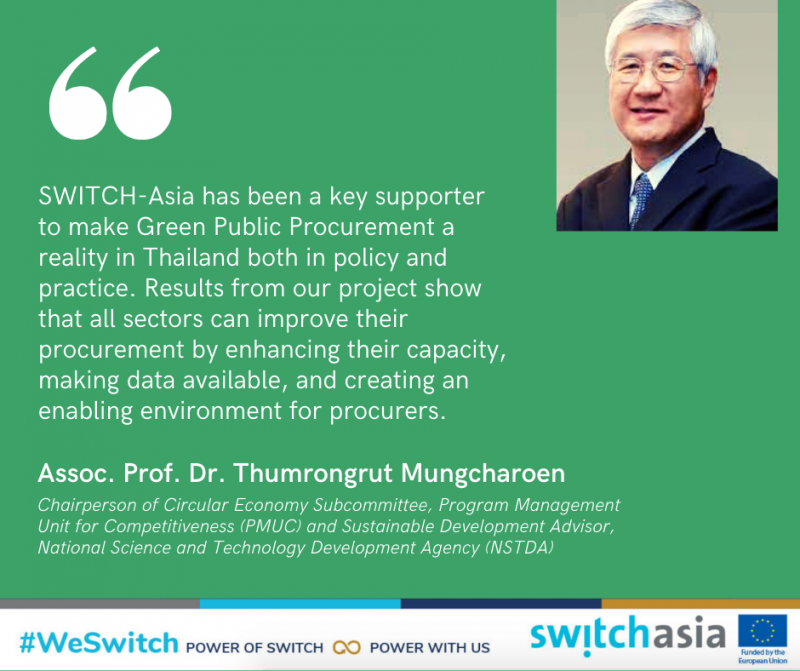
When: 21 February 2022 I Time: 13:30 - 15:30 (Bangkok Time) I Watch the Session Recording HERE
Background
The European Commission defines Green Public Procurement (GPP) as a process, whereby public authorities seek to procure goods, services and works with a reduced environmental impact throughout their life cycle when compared to goods, services and works with the same primary function that would otherwise be procured. The benefits associated with GPP implementation are not limited to environmental impact but can also include social, health, economic or political benefits.
Over the last two decades, there has been growing political commitment to promote GPP not only in EU member states but also at international level, with sustainable procurement policies having been launched in many countries, including in Southeast Asia. In this region, almost every country integrates GPP in their national policy. However, in order to drive green markets and GPP, countries require mechanisms and tools to be in place. Green Procurement (GP) has also been promoted among the private sector and general consumers, contributing to both sustainable consumption and production (SCP).
In 2020, as part of its SCP policy support to Thailand, the EU SWITCH-Asia SCP Facility has implemented the project: “Mainstream Green Integration of Thailand: Transformation from Policy to Implementation”. Under this initiative, a Green Procurement Policy, an Action Plan, and a National Green Directory have been integrated with Thailand’s Action Plan of Green Procurement Promotion (2021-2022) developed by the Pollution Control Department (PCD), the organisation responsible for GPP/GP in Thailand. This model was also developed to test how to advance green procurement in other government agencies, both central and local, as well as among private sector organisations. In 2021, the EU SWITCH-Asia Regional Policy Advocacy Component (RPAC) has partnered with the Asia Pacific Roundtable for Sustainable Consumption and Production (APRSCP) to conduct a study to enhance the uptake and implementation of GPP Policies in Southeast Asian countries, using the results of the project, “Mainstream Green Integration of Thailand: Transformation from Policy to Implementation” supported by the SCP Facility. The SCP Facility is supporting this project by reviewing the studies conducted by the APRSCP and by supporting this sub-regional webinar.
Objective
The objective of this webinar is to share results of the study and discuss how to enhance the uptake and implementation of GPP Policies in Southeast Asian countries, presenting case studies from Thailand and the EU. Main implementation challenges as well as enabling factors and solutions from the region will also be discussed.
A series of national webinars will also be organised in Indonesia, Malaysia and the Philippines (see Country Brochures for Agenda and event details)
INDONESIA
11 February 2022 I 08:30 – 11:30 (Jakarta Time) I Register here
According to the President of the Republic of Indonesia Regulation No. 59/2017, Green Public Procurement (GPP) is one of the programmes for implementing the agenda for sustainable consumption and production (SCP). The latter is concerned with the achievement of the Sustainable Development Goals in line with the country's Regional Action Plan on Sustainable Development Goals, a 5-year work plan established at the provincial level. In 2019, the Ministry of Environment and Forestry of Indonesia issued the Ministerial Regulation No. 5 or the Procedure for Application of Eco-friendly Labels for Green Public Procurement (GPP). Eco Labels are an attempt to standardise and clearly communicate the environmental impacts of products and services to customers. To support the harmony between industrial development and environmental sustainability, the Indonesian government has also established a Timber Legality Verification System (TLVS/SVLK) to ensure that all timber products circulating and traded in Indonesia have a legal status. This webinar aims to encourage IKN's (Ibu Kota Negara/ Nation’s Capital City) development by utilising the GPP instrument to become a Smart City. In order to achieve this objective, companies must become part of the Green Industry, uptaking a green productivity model.
MALAYSIA
14th February 2022 I 9:15 – 12: 30 (Kuala Lumpur Time) I Register here
The Government Green Procurement (GGP) in Malaysia has been implemented successfully for the past few years. The 12th Malaysia Plan stated that “Industries will be encouraged to accelerate the adoption and implementation of green practices, particularly sustainable consumption and production (SCP) practices. The expansion of green procurement initiatives will increase demand for green products and services and catalyse the industries to shift towards green practices”. This is in line with the Sustainable Development Goal 12: Responsible Consumption and Production. More awareness and promotion of green procurement among private sector are needed. The Environmental Management and Research Association of Malaysia (ENSEARCH) and the Asia Pacific Roundtable on Sustainable Consumption and Production (APRSCP) are organising a webinar to share the results of the GGP implementation status in Malaysia and to create a conversation on how green procurement can be implemented in the private sector. This will promote and encourage local industries, service providers, and manufacturing industries to develop further mechanisms and platforms for the private sector to adopt green procurement as part of their Environmental, Social, and Governance (ESG) strategies.
THE PHILIPPINES
10 February 2022 I 14:00 – 16:00 (Manila Time) I Register here
Sustainable development and transitioning towards a greener economy rely on a holistic cycle that reduces the impact of economic activities on the environment, with a focus on enforcing greener life-cycle of products, building market demand for sustainable products and production technologies, and shifting consumer choices to make informed decisions towards sustainability. The Philippines commits to sustainable consumption and production (SCP) with the end goal of shifting towards a circular economy. This webinar opens the conversation on mainstreaming sustainable procurement in the public and private sectors, and reports on the current status of Green Public Procurement (GPP) implementation in the country. This webinar will particularly be insightful to key procurement decision makers in any organisation, academics who teach and advocate for CSR, sustainable business, among others, scholarly researchers in the field of sustainable consumption and production.






